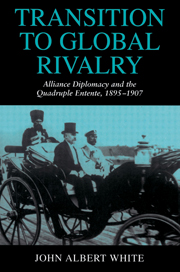Book contents
- Frontmatter
- Contents
- List of illustrations
- List of maps
- Preface
- Chronology
- List of abbreviations
- 1 Portents of conflict
- 2 The focus of hostility
- 3 The emergence of encirclement
- 4 Russia in political recession
- 5 The Algeciras factor
- 6 After Portsmouth and Algeciras
- 7 Imperial truce
- Appendices
- Bibliography
- Index
4 - Russia in political recession
Published online by Cambridge University Press: 04 August 2010
- Frontmatter
- Contents
- List of illustrations
- List of maps
- Preface
- Chronology
- List of abbreviations
- 1 Portents of conflict
- 2 The focus of hostility
- 3 The emergence of encirclement
- 4 Russia in political recession
- 5 The Algeciras factor
- 6 After Portsmouth and Algeciras
- 7 Imperial truce
- Appendices
- Bibliography
- Index
Summary
Domestic checkmate
The year 1905 began with events so calamitous for Russia as to augur even further misfortunes. The fall of Port Arthur at the very beginning of the year was followed three weeks later by the outbreak of revolution. These signs of a decline in Russian power and prestige set in motion both internal and external demands of rivals wishing to use the opportunity to enhance their own positions at the expense of Russia or of her ally, France.
Internally there emerged demands from the people for a clearer and firmer voice in the affairs of state. A reapportionment of priorities was expressed by Count Witte in his memorandum of October 9, 1905 to the Emperor: “The government should openly and sincerely strive for the good of the state, and not for the preservation of one or another of its forms.”
Externally this pattern of decline raised expectations in some quarters for a share in the benefits of Russian defeat. One such desire was expressed by the Amir of Afghanistan who, inspired by the example of Japan, would have liked to rid himself of further Russian pressure by a forceful move against his powerful and troublesome neighbor. It also raised the hopes of the German government for greater freedom of action and a more dominant role in Europe, as unencumbered as possible by the restraints of potential threats of either Russian or French power.
The devolution of Russian power and prestige, in addition to being noted by domestic and foreign observers, was inscribed and perpetuated in the Portsmouth treaty and in due course incorporated into the national foreign policy.
- Type
- Chapter
- Information
- Transition to Global RivalryAlliance Diplomacy and the Quadruple Entente, 1895–1907, pp. 120 - 156Publisher: Cambridge University PressPrint publication year: 1995



